Antelope Canyon – Page Arizona
Antelope Canyon is one of the must visit locations for photographers. Yes it is one of the most photographed canyons in the United States, but there is a good reason for that. Antelope Canyon is absolutely a gorgeous place for photography.
Antelope Canyon is at once one of the most breathtaking and tranquil places on earth. Gently carved from the Navajo sandstone over the course of countless millenniums, the slot canyons are majestic and narrow passages, just enough space for a small group to walk the sandy floor – and for the occasional shafts of sunlight to shine down from above.
To older Navajos, entering a place like Antelope Canyon was like entering a cathedral. They would probably pause before going in, to be in the right from of mind and prepare the protection and respect. This would also allow them to leave with an uplifted feeling of what Mother Nature has to offer, and to be in harmony with something greater than themselves. It was (and is) a spiritual experience.
Upper Antelope Canyon – Page Arizona
Cost:
Fees vary with the tour provider that you choose and the length of the tour. A regular tour will run around $30.00, most of the photo tours will run around $50.00 per person.
Best Time to Visit:
The best time of the year to visit is in the spring or fall when there are fewer tourists. One of the biggest obstacles of photographing the canyon is to not have people walking through your shot.
Where it is:
Just outside of Page Arizona a small town located on the southern shores of Lake Powell.
Directions:
Most of the tours will leave from the tour offices located in Page, where they will provide transportation to the canyon. You can also drive to the Entrance Station from March to October, located on Hwy 98 4 miles east of Page Arizona.
Map:
Links:
ANTELOPE CANYON-LAKE POWELL NAVAJO TRIBAL PARK
Antelope Canyon Tours
Page and Lake Powell Tourism
Geology Antelope Canyon was formed by erosion of Navajo Sandstone, primarily due to flash flooding and secondarily due to other sub-aerial processes. Rainwater, especially during monsoon season, runs into the extensive basin above the slot canyon sections, picking up speed and sand as it rushes into the narrow passageways. Over time the passageways are eroded away, making the corridors deeper and smoothing hard edges in such a way as to form characteristic ‘flowing’ shapes in the rock.Flooding in the canyon still occurs. A flood occurred on October 30, 2006 that lasted 36 hours, and caused the Tribal Park Authorities to close Lower Antelope Canyon for five months.
GPSCoordinates 36° 51′ 28″ N, 111° 22′ 20″ W
Decimal 36.857778, -111.372222
Tips for the Photographer
Equipment: It is very low light conditions when shooting in the canyon, you will absolutely need a good tripod and use a cable release or self timer. A wide angle lens is needed to shoot inside the canyon since it twists and turns and you cannot back away to get the shot.Bring plenty of extra batteries, long exposures will drain batteries faster.
What to Photograph:
The magnificent sandstone shapes, with the light and shadows working in the canyon to create a wonderland full of fantastic color.
Photography Tips:
Shoot using available light, do not use a flash (doing so will wipe out all of the fantastic color and shadows and make for a very flat boring image of rocks) Exposure times will be in seconds in many parts of the canyon. Use a small aperture for depth of field and a low ISO for a good sharp image. If you are shooting digital, use the LCD and the histogram to check exposure, the histogram will show if you are totally under or over exposing areas in the scene. Do not shoot up into the sky through the top of the canyon.This is one of the exceptions to shooting in the golden hour, the best time of day is actually when the sun is directly overhead, and not overcast. At around noon you can shoot shafts of light coming down into the canyon. Be sure to throw a little dust into the air to make the light beam show up well.
Notes
There is no hiking or climbing involved, only easy walking on the Canyon floor which is level for the most part.
Photographic Tour
Antelope Canyon is only open through a tour operator authorized by the Navaho Nation.
Antelope Canyon Photo Gallery
Click Here for full page gallery
More Photographic Destinations in Arizona:
Interactive Google Map
Use the map + – controls to zoom in and out, use the Map drop-down to change to “Map”, “Satellite”, “Hybrid”, or “Terrain” views. Drag the little man icon from the upper left corner to a map location for street level view. Click on a pushpin for more information about the Photographic Destination, then click on the title to go to the location page.
Click Here for Photographic Destinations by State
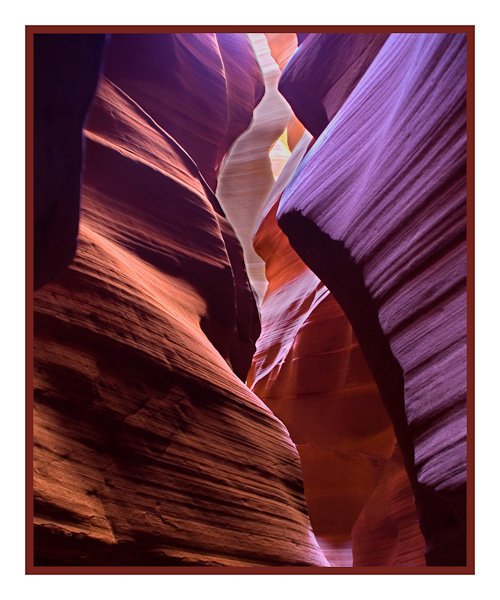

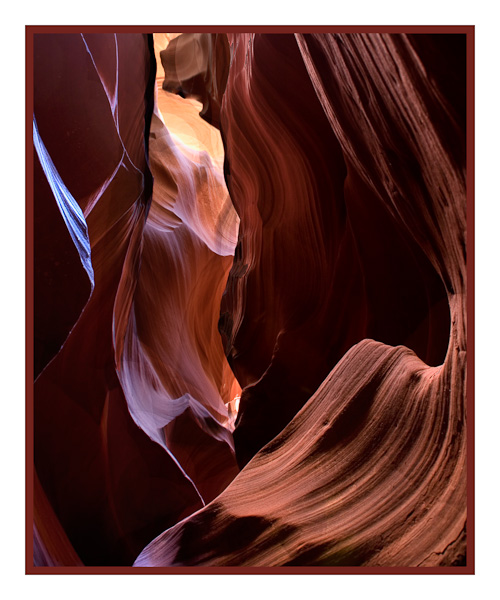
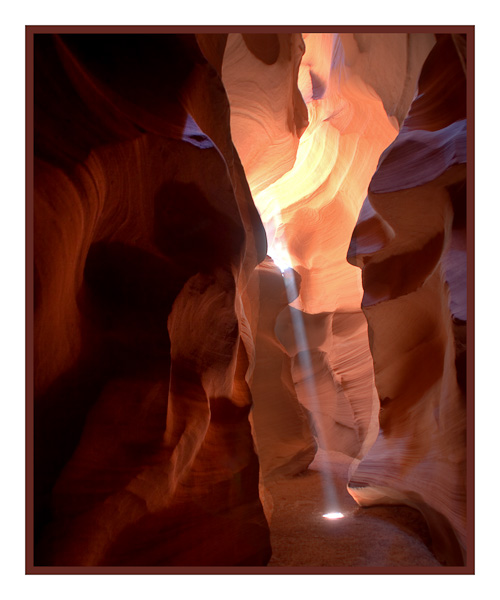
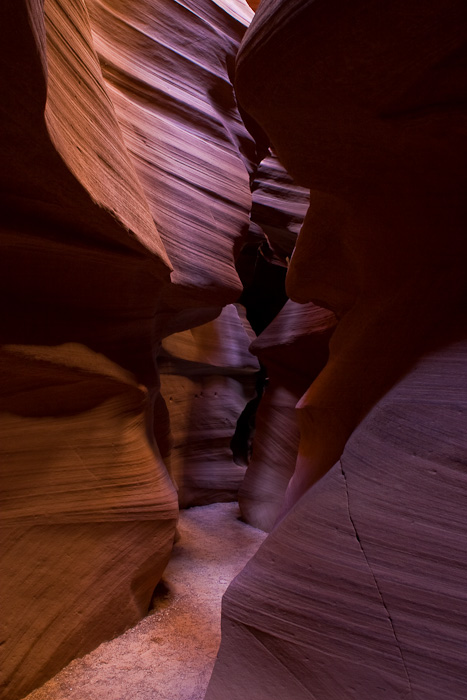
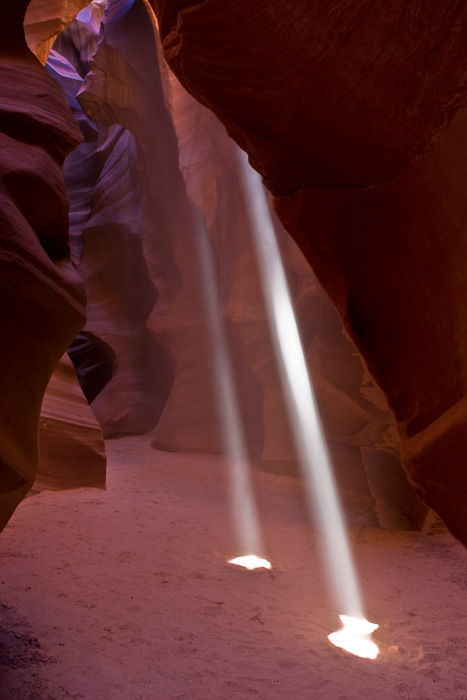
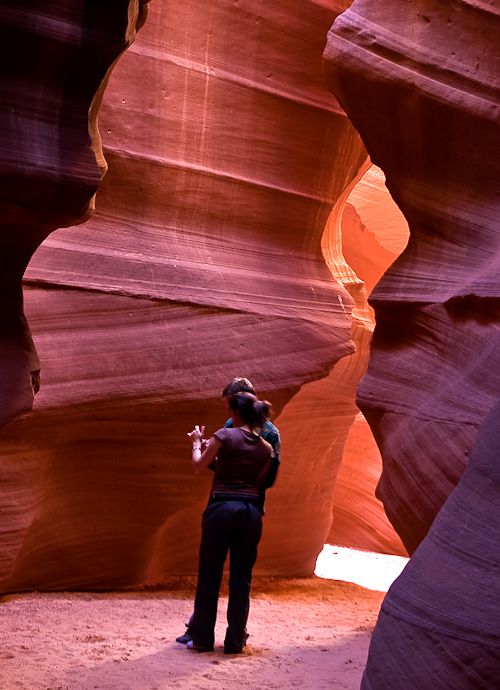
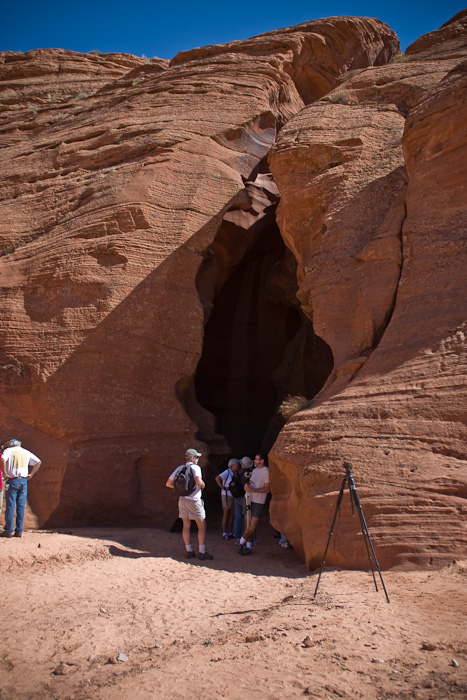
Hi, Greg,
I’ve visited the Lower Antelope Canyon and would like to thank you for the info here. Here you can find my pictures. http://colormaniac.smugmug.com/Landscapes/antelopecanyon2010/12278716_5xjV9#875720708_Lxa7A. To make your page more informative, I’d like to add the following:
It costs me $26 to get a photographer’s permit for 4 hours. In between their tours, I have about 15-20 minutes to take pictures. (If someone spends more than 4 hours, he/she would get charged for extra!)
It seems that the Upper Antelope has a much bigger entrance opening. And there is the “sunbeam spot” that the Lower Antelope doesn’t have. Some parts of the Canyon are very narrow and it could be hard for a big guy to squeeze through.
Sometimes sands come down from above like rain. I used Canon 17-55mm f/2.8 lens. Now I have to send it back to Canon for cleaning due to the sands that get in the rotating part.
I used hi-speed continuous shooting to get 3 pictures of different exposures for every scene. It saves my time for adjusting exposure on the computer to see which ones are the best.
Hello, thank you very much for this page! I’m going there to take pictures and find this very helpful. However, there is one thing that gets me baffled. According to this page, http://www.lowerantelope.com/aboutTheTour.php, the entrance fee is not that much. Is it because there are many areas under different offices? If I get the photographer’s permit as mentioned in that page, would I still get to see what you are showing here? Thank you!